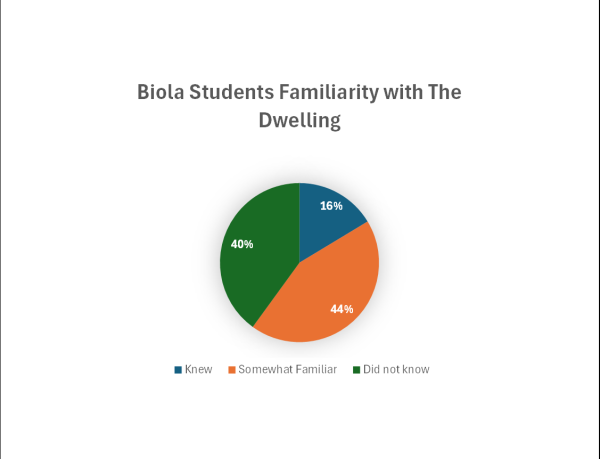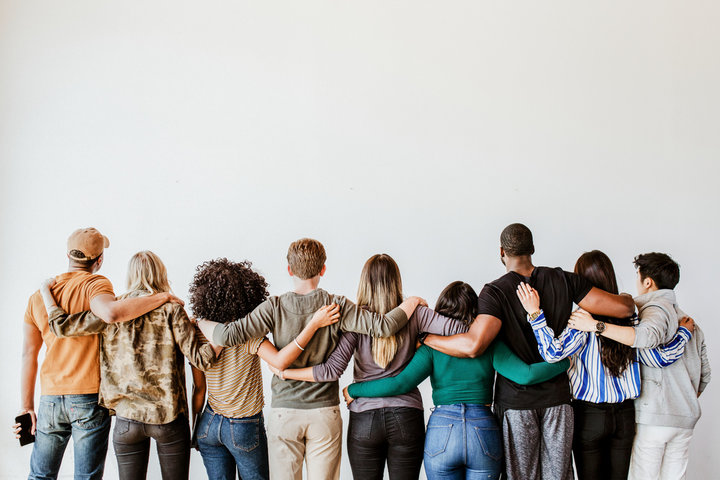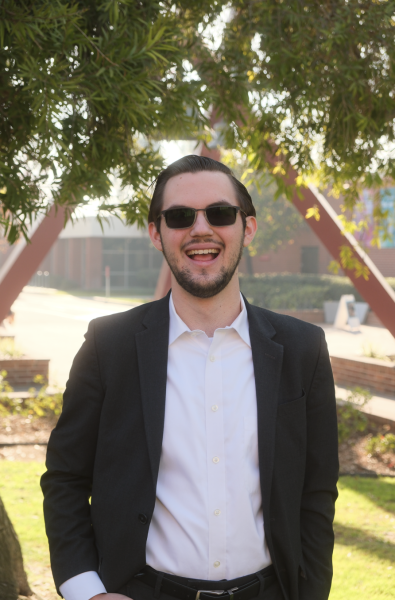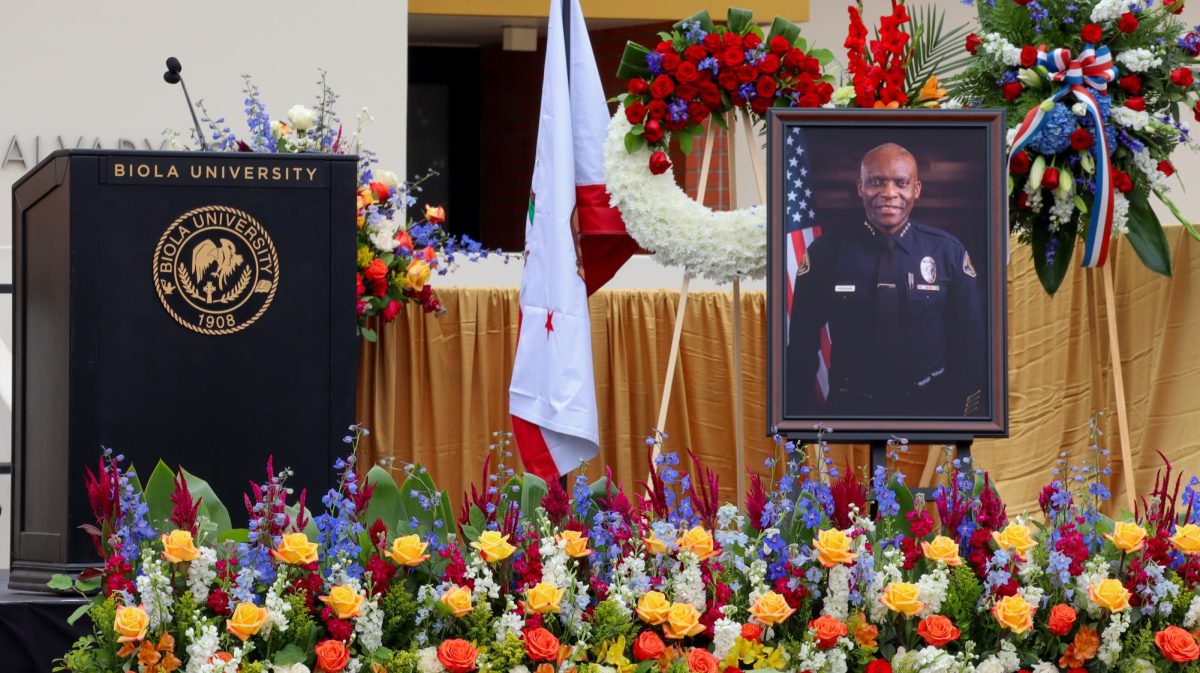As The Dwelling nears its seventh birthday, there is still a lot of confusion among students about the group and how it functions. Recently, changes at Biola University and policies enacted by the Trump Administration have increased the uncertainty surrounding groups like The Dwelling. In Summer 2024, Biola University cut its D&I division, which sparked alarm amongst students. The initiatives by the Trump Administration created more fear regarding Diversity, Equity and Inclusion (DEI) programs and the protection of LGBTQIA+ individuals. In Jan. 2025, the Trump Administration issued an executive order to terminate all federal DEI programs. Following suit, dozens of companies discontinued their DEI programs. In March 2025, the Trump Administration started investigating whether California’s law on protecting the privacy of LGBTQIA+ youth in schools is unconstitutional. These events and the polarized state of American politics make understanding The Dwelling all the more important.
Since Fall 2016, a Biola-sanctioned group has existed for LGBTQIA+ and Same-Sex Attracted (SSA) students. The Dwelling has a history of providing a safe space for these students, remaining a special place amid leadership transitions and COVID-19 challenges.
NOTABLE BIOLA LGBTQIA+ CONTROVERSIES
In the 2000s, numerous events sparked tension involving LGBTQIA+ and SSA students at Biola University. In 2006, the Soulforce Equality Ride was a bus of 35 LGBTQIA+ students that stopped at 19 colleges and universities, 16 of which were faith-based. When the group arrived at Biola, the university hosted and conversed with them. In May 2012, Biola University made headlines with the anonymous Biola Queer Underground (BQU). Students who identified as LGBTQIA+ or SSA created the BQU to voice their concerns about Biola’s policies. On May 10, 2012, Biola released a letter from Biola President Barry Corey, and the board of trustees approved Biola’s initial statement on Sexuality, Gender and Relationships that had been in development for 18 months.
In 2017, the creation of the Nashville Statement, which affirms traditional Christian views on sexuality, invoked mixed feelings within Christian and academic spheres. Some LGBTQIA+ and SSA Biola students responded by publishing an open letter to Corey. Then, in Fall 2018, there was a temporary policy change by Azusa Pacific University; they removed their prohibition on LGBTQIA+ relationships and a few days later, reinstated it. This prompted Biola to reaffirm its statement on Sexuality, Gender and Relationships.
Despite the numerous controversies at and actions taken by Biola, it does not negate the fact that students in the past, present and future will identify as LGBTQIA+ and SSA. The culmination of these events painted a clear picture: these students needed a safe space on campus.
BEFORE THE DWELLING
In Spring 2014, a group of Biola faculty members started working on creating a safe space for LGBTQIA+ and SSA students. In Fall 2016, this initiative came to fruition when Matthew Hooper, the associate dean of students at the time, and Michelle Willingham, the current director of the Biola Counseling Center, co-created a group called Sustinere. James Petitfils, an associate professor of New Testament, served as a faculty member of the group. The mission statement of Sustinere read: “[Sustinere] will seek to provide a caring and supportive community where students can journey together as they learn to live authentically and lovingly with same-sex attractions, orientations, and identities. [The group is] led by staff/faculty advisors and student leaders, the group will aspire to be a safe space for students who experience enduring same-sex attractions or identify as having a same-sex sexual orientation or identity.” After operating for two years, the group was disbanded, and The Dwelling took its place.
THE FOUNDING OF THE DWELLING
In 2017, Chris Barragan, who served as the assistant director of Pastoral Care, started working on creating The Dwelling. Unlike Sustinere, The Dwelling was not a response to any one event. In Spring 2018, Barragan founded the group. However, there is debate over whether Sustinere changed its name to The Dwelling or if The Dwelling was an entirely new group. Here is what Barragan had to say about the name change.
“Sustinere and The Dwelling could not be more different,” Barragan said. “The Dwelling took a very different shape and approach than Sustinere.”
In addition to the Biola faculty, The Dwelling typically had one or two student interns who assisted in responding to emails, planning gatherings, interacting with students and other tasks.
Barragan oversaw The Dwelling until he departed from Biola University in 2023. Subsequently, Chad Miller, the director of Pastoral Care and student-led ministries, took over from Barragan. Currently, Miller, guides the group with the help of a Torrey Honors College professor, Matt Jenson, Revoice care minister Janelle Look and a yearly rotating Biola Counseling Center intern.
WHAT IS THE DWELLING?
Many students are unfamiliar with The Dwelling and what the group does. The Chimes surveyed 55 students around campus about their familiarity with The Dwelling. 40% of students had never heard of the group, 44% were somewhat familiar with the name and 16% recognized the group and its purpose.

According to the Biola directory, The Dwelling “aims to be a caring and supportive community where students who identify as LGBTQ or experience same-sex attraction (SSA) can follow Jesus together as they seek to navigate their sexuality and gender in allegiance to Christ by the power of the Spirit, living in accordance with Biola’s community standards on sexual behavior.”
The faculty leading this group further clarified the official statement.
“The Dwelling is a Biola-sanctioned place where students who are LGBTQ or who experience same-sex attraction come together for community and support as they walk with Jesus at Biola,” said Jenson. “The ‘Biola-sanctioned’ bit points to the fact that we are an official Biola group and also that we align [with] Biola’s beliefs re: sexuality and gender (though some of the students may not do so). What we aren’t is 1.) a place that sponsors conversion therapy or whose primary goal is to move people out of the LGBTQ community, or 2.) a place that is subversive of Biola’s positions on sexuality and gender.”
Miller added that The Dwelling aims to simply be a place for LGBTQIA+ students to gather, and does not require its members to hold to Biola’s own view.
“It’s not a place where we’re trying to hash out political issues or change views of anybody,” said Miller. “It’s just an acknowledgement that there are [LGBTQIA+ and SSA] students here at Biola, and it’s a place where they can come be together and offer a community.”
Miller and Jenson stated that The Dwelling is committed to anonymity, and there is safety in that commitment. There is no such thing as recording attendance or tracking students. The only form of list is an optional email where all participants are blind carbon copied (BCC’d). The email is confidential, meaning no one besides Miller and The Dwelling intern(s) can access the account. The requirement for everyone who attends any meeting is that everyone’s identities and what is discussed stay in the room.
HOW DOES THE DWELLING FUNCTION?
Over the last seven years, the way The Dwelling functions has varied, but core activities have remained the same.
Once a month, faculty would host a large discussion where members were invited to come and discuss different aspects of their lives. Meals were often made together; if not, snacks and drinks were provided. Members of The Dwelling usually hold diverse theological perspectives on sexuality. Some members hold an affirming position, while others hold a non-affirming view. Out of respect for privacy and safety, the meeting’s date, time and location are not publicly known.
Under Barragan’s leadership, one of the group’s priorities was celebrating holidays together. For each holiday, there would be themed discussions and decorations. However, the two holidays that stood out to him were Valentine’s Day and Thanksgiving. Regarding Valentine’s Day, Barragan described that a frequent topic was the experience of having a crush.
“Valentine’s Day was often one of the gatherings where we talked about crushes and what that was like, how really lonely and challenging it can feel because you want to say something, but you don’t want to say something,” Barragan said. “[It] was always a time where we were able to dive a little bit deeper into what is love and what is connection and experience this sense of belonging with one another.”
He commented on the importance of The Dwelling members celebrating Valentine’s Day.
“In a culture that’s so hyper-focused on romantic relationships, what a gift to experience platonic relationships with one another, and to exchange Valentines, flowers, and candies. I remember the times where, [regardless of] the themes and rhythms in our culture, we would find these on ramps to experience togetherness.”
When celebrating Thanksgiving, the group cooked a large meal together. They turned their meeting space into one very long table with plates, tablecloths, candles and everything else to create a cozy atmosphere.
While Barragan was involved, there were smaller, informal gatherings only for student members and interns called “LGBTQ night,” which stood for “Literature, God, Blogs, Thoughts and Questions.” Students would either bring a blog that they read, a book, a piece of literature, a question, something inspiring, or something upsetting to the meeting and chat with one another about it.
The creation of the LGBTQ nights was in response to how, after the larger sessions, students would linger to hang out until the early hours of the morning. Barragan realized that “we needed to create more consistency because it felt like people were just starved for connection.” He said students concerned about attending the main sessions were more willing to participate in the LGBTQ nights. Also, Barragan noted that the LGBTQ nights created a good rhythm for students who wanted to connect one-on-one in a less formal way.
Currently, The Dwelling continues to have one large monthly gathering to process events, discuss what is going on in the students’ lives, and support one another in community. No meals are cooked, but a plethora of snacks and drinks are provided. The LGBTQ nights are no longer happening, though members often connect outside the meetings.
SETBACKS AND CHALLENGES
The Dwelling has faced numerous unique struggles. One of the more prominent issues is the false impressions that many people have. There is a lot of uncertainty amongst students, especially LGBTQIA+ and SSA individuals, who fear that The Dwelling is some form of conversion or reparative therapy. On the other hand, some believe The Dwelling is pushing a more liberal view onto students.
“I think for someone who doesn’t have the time, or doesn’t have the will to really learn what we’re about, it’s easy to kind of quickly overreact with a false impression of what The Dwelling is,” said Jenson.
In addition to misconceptions, The Dwelling often finds itself carefully navigating the balance of being known yet unknown on campus. In the past, when meeting times were publicly available, there were instances of Biola students showing up to cause harm, which threatened the group’s privacy and safety. Since then, all meeting dates have been kept private. Barragan also pointed out that The Dwelling received a lot of criticism from all sorts of people over the years.
The COVID-19 pandemic caused challenges for The Dwelling, as the group needed to shift from in-person to online meetings. Before COVID-19, The Dwelling consistently had 30 to 50 members attend the monthly meetings. However, after COVID-19, the average attendance decreased to eight to 15 members.
“I don’t think eight to 15 is the [total] number of LGBTQ students on campus; neither was 30,” said Jenson. “And so again, the numbers don’t matter, but we want to be able to love and care for and walk alongside anyone who we could.”
Jenson speculates that the number decrease may be due to a shift in Biola’s culture and other complicated factors.
“All that to say I have less of a sense of why people aren’t coming today,” said Jenson. “I’m sad about it, just because I think there have got to be folks who would be helped by this group.”
CLOSING REMARKS
The infographic below provides confidential methods for contacting someone regarding the contents of this article. LGBTQIA+ and SSA groups on Biola’s campus have almost a decade of experience, stories and challenges. Despite the different obstacles that it faces, The Dwelling continues to relentlessly strive to meet its goals of creating a safe community to love and support LGBTQIA+ and SSA students. Miller and Jenson invite all students, regardless of their theological views, political opinions, sexuality, or gender, to join the conversation about human sexuality. They hope more LGBTQIA+ and SSA students reach out about attending The Dwelling, and that more people know of the group.







